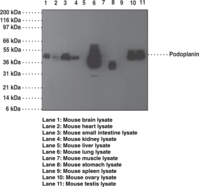Clone designation:
pmab-1
·
Host:
rat
·
Application(s):
FC and WB
·
Podoplanin is a 43 kD type 1 transmembrane glycoprotein found on many tissues. Podoplanin appears to be
differentially expressed by lymphatic endothelial cells but not blood vessel endothelial cells.1 Podoplanin has also been found to be expressed on a wide variety of tumors. It appears to be involved in lymphangioigenesis and promoting cell migration.2 Recently, there are indications of podoplanin presence on Th17 cells.3 In a murine EAE model for autoimmune disease it has been shown that Th17 cells migrate quickly to the CNS at EAE onset. Injection of antibody to podoplanin in mice also immunized with myelin antigen to induce EAE results in elevated numbers of Th17 cells in the CNS. Thus as in effecting migration of tumor cells, podoplanin may also promote migration of committed Th17 cells to sites of inflammation in autoimmune diseases.
1
Schacht, V., Dadras, S.S., Johnson, L.A., et al. Up-regulation of the lymphatic marker Podoplanin, a mucin-type transmembrane glycoprotein, in human squamous cell carcinomas and germ cell tumors. Am J Pathology 166(3) 913-921 (2011).
2
Farr, A., Nelson, A., and Hosier, S. Characterization of an antigenic determinant preferentially expressed by type I epithelial cells in the murine thymus. J Histochem Cytochem 40(5) 651-664 (1992).
3
Bettelli, E. Interplay between pathogenic and regulatory T cells in EAE. (2011).






